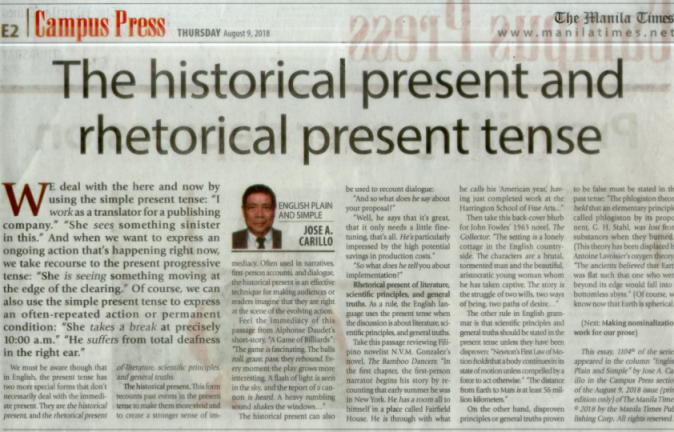We deal with the here and now by using the simple present tense: “I
work as a translator for a publishing company.” “She
sees something sinister in this.” And when we want to express an ongoing action that’s happening right now, we take recourse to the present progressive tense: “She
is seeing something moving at the edge of the clearing.” Of course, we can also use the simple present tense to express an often-repeated action or permanent condition: “She
takes a break at precisely 10:00 a.m.” “He
suffers from total deafness in the right ear.”
We must be aware though that in English, the present tense has two more special forms that don’t necessarily deal with the immediate present. They are
the historical present, and
the rhetorical present of literature, scientific principles, and general truths.
The historical present. This form recounts past events in the present tense to make them more vivid and to create a stronger sense of immediacy. Often used in narratives, first-person accounts, and dialogue, the historical present is an effective technique for making audiences or readers imagine that they are right at the scene of the evolving action.
Feel the immediacy of this passage from Alphonse Daudet’s short-story, “A Game of Billiards”: “The game
is fascinating. The balls
roll, graze, pass; they
rebound. Every moment the play
grows more interesting. A flash of light
is seen in the sky, and the report of a cannon
is heard. A heavy rumbling sound
shakes the windows…”
The historical present can also be used to recount dialogue:
“And so what
does he say about your proposal?”
“Well, he
says that it’s great, that it only
needs a little fine-tuning, that’s all.
He’s particularly impressed by the high potential savings in production costs.”
“So what
does he tell you about implementation?”
Rhetorical present of literature, scientific principles, and general truths. As a rule, the English language uses the present tense when the discussion is about literature, scientific principles, and general truths.
Take this passage reviewing Filipino novelist N.V.M. Gonzalez’s novel,
The Bamboo Dancers: “In the first chapter, the first-person narrator
begins his story by recounting that early summer he was in New York. He
has a room all to himself in a place called Fairfield House. He
is through with what he
calls his ‘American year,’ having just completed work at the Harrington School of Fine Arts...”
Then take this back-cover blurb for John Fowles’ 1963 novel,
The Collector: “The setting
is a lonely cottage in the English countryside. The characters
are a brutal, tormented man and the beautiful, aristocratic young woman whom he has taken captive. The story
is the struggle of two wills, two ways of being, two paths of desire…”
The other rule in English grammar is that scientific principles and general truths should be stated in the present tense unless they have been disproven: “Newton’s First Law of Motion
holds that a body
continues in its state of motion unless compelled by a force to act otherwise.” “The distance from Earth to Mars
is at least 56 million kilometers.”
On the other hand, disproven principles or general truths proven to be false must be stated in the past tense: “The phlogiston theory
held that an elementary principle, called phlogiston by its proponent, G. H. Stahl,
was lost from substances when they burned.” (This theory has been displaced by Antoine Lavoisier’s oxygen theory.) “The ancients
believed that Earth
was flat such that one who went beyond its edge would fall into a bottomless abyss.” (Of course, we know now that Earth is spherical.)
 This essay, 1104th of the series, appeared in the column “English Plain and Simple” by Jose A. Carillo in the Campus Press section of the August 9, 2018 issue (print edition only) of
This essay, 1104th of the series, appeared in the column “English Plain and Simple” by Jose A. Carillo in the Campus Press section of the August 9, 2018 issue (print edition only) of The Manila Times
, © 2018 by the Manila Times Publishing Corp. All rights reserved.(Next:
Making nominalization work for our prose) August 16, 2018